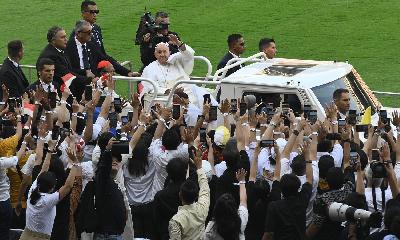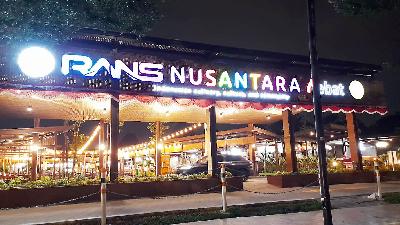A Realistic Free Lunch Program
Monday, September 9, 2024
The free lunch program needs to be selective that the provinces with high prevalence of malnutrition should be put on the priority list.
arsip tempo : 174521478378.

Realistic Free Nutritious Meal
THE Prabowo Subianto administration appears serious about fulfilling its political promise to implement a free lunch program, now known as the free nutritious meal program, for schoolchildren. Pilot kitchens have been established and are operational in Sukabumi and Hambalang, Bogor in West Java; and Tangerang in Banten. Politically, this program is a positive move, demonstrating that election promises to the people should be realized, rather than just empty rhetoric.
Providing free nutritious meals to all schoolchildren every working day across the archipelago is a commendable program. However, this must be carefully considered as the budget is substantial. There is a risk that this program might divert funds needed for education, infrastructure development, subsidies for farmers and fishermen, public health, and other essential areas.
Therefore, the target should be carefully decided, focusing on those most in need, such as provinces with the highest stunting prevalence. These include East Nusa Tenggara, West Sulawesi, Papua, West Nusa Tenggara, and Aceh. Alternatively, the classification could be based on regency or cities with the highest rates of malnutrition. In other countries, similar programs are based on the economic status of families living below the poverty line.
In addition to targeting alternatives, the frequency of implementation could be adjusted. The program could be run not every day of the week, but two or three times a week. Nonetheless, recipients would still receive free nutritious meals. Public education on the importance of nutritious food could also be enhanced.
Dr. Soen’an Hadi Poernomo
Pasar Minggu, South Jakarta
Haji Isam’s Right of Reply
AS the legal representative of Haji Andi Syamsuddin Arsyad, also known as Haji Isam, I, Junaidi Tirtanata, SH, LLM, wish to issue a right of reply concerning the Tempo English article from September 2-8, 2024 edition, in the Economy section, titled Jalur Koalisi di Pejompongan (Political Maneuvering for BPK Seats).
The article states, “Bobby, according to the news source, also received support from outside Golkar, among others being big businesspeople. One of them was Andi Syamsuddin Arsyad, known as Haji Isam, the owner of Jhonlin Group. According to a politician, on Friday, August 23, 2024, Bobby was brought by Golkar Party Secretary-General Muhammad Sarmuji to meet Isam at his home in the Widya Chandra area, South Jakarta. To Isam, Sarmuji introduced Bobby as a candidate for BPK (Supreme Audit Agency).”
The report attempts to mislead public opinion and accuses our client of being involved in supporting the candidacy for the Supreme Audit Agency. The Tempo editorial team did not seek direct confirmation or clarification from our client regarding the accuracy of the accusations they made publicly. Therefore, the reporting becomes highly biased, unprofessional, and unbalanced.
We must emphasize that our client is not involved in and has no interest in supporting anyone for the BPK candidacy. Furthermore, our client is a national entrepreneur with no authority over the nomination of BPK members. Therefore, we request that the Tempo magazine editorial team correct the reporting and publish this right of reply addressing the objections we have raised.
Junaidi Tirtanata, SH, LLM
Haji Isam’s Lawyer
Thank you for your response. We have written responses from several figures who attended the meeting, including Rifqinizamy Karsayuda, who stated that he is with Haji Isam every day—Ed.
Free Lunch Budget
DESPITE the various controversies that have arisen, the free lunch or free nutritious meal program should be supported. We must appreciate the good intentions of the Prabowo Subianto administration. Regarding budgetary issues, it is up to the government to ensure that the necessary funds are available. However, there are several aspects that need the government’s attention in its implementation.
The set amount of Rp15,000 per meal portion should not be used as a rigid standard. Some regions may need Rp20,000 per meal, while in others, Rp10,000 may be sufficient. Nevertheless, Rp15,000 can still serve as a general benchmark for overall budget allocation. This means there will be cross-subsidization between regions.
The provision of free nutritious meals should be implemented gradually, not simultaneously across Indonesia. It is advisable to start the program in remote and underdeveloped rural areas with lower economic and welfare levels. Government-managed schools should be prioritized, considering that many students in these schools come from underprivileged backgrounds.
Catering companies providing free nutritious meals should be limited to their operational areas, specifically from the regency or city where the school is located. Regular food quality inspections must be conducted to ensure that the meals consumed by schoolchildren are truly nutritious and meet health standards.
Samesto Nitisastro
Depok, West Java











